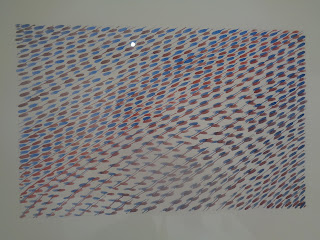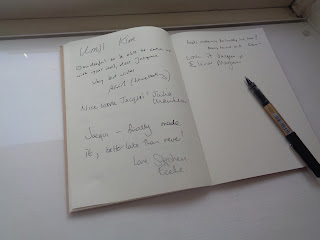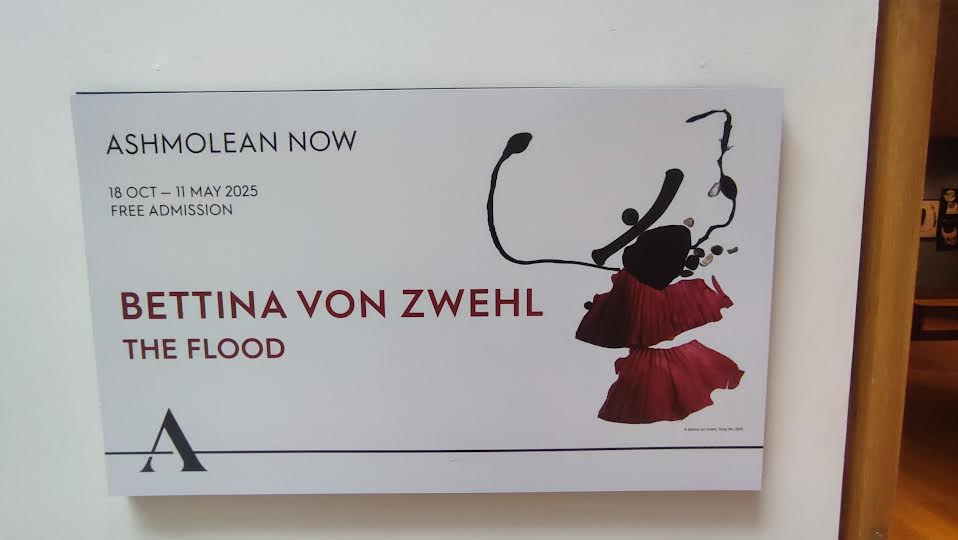this, that and the other: Jacqueline Poncelet - Richard Saltoun - Review
★ ★ ★ ★ ☆
I return to writing after a considerable hiatus with a small
spree of contemporary arts exhibition reviews. The subjects of the following reviews
were encountered in Mayfair on Friday 2nd May. I am in London for a
social occasion and, arriving early at Victoria Station, decide to beat the
swealtering heat by ducking into a few exhibitions.
Up first, ‘this, that and the other: Jacqueline Poncelet’ at
Richard Saltoun. Shown between March 11 – May 3 – myself arriving on the
penultimate day – this exhibition showcases an retrospective of Poncelet’s
varied and impressive career. Poncelet’s work ranges from ceramics to
watercolours, each of her works possessing innate character, rhythm and motion.
I chose this exhbition as my starting point on the strength of the poster. On it, an image of her ceramic work ‘untitled no. 5’. Within the gallery space, two key sculptures were hidden in shaded alcoves. This bestowed them with an anthropomorphic presence, as if they were creatures skulking in the corners. They immediately evoke the work of Sean Tan, specifically the creatures of The Lost Thing. Their textured surface showcased beautiful patterns.
 |
Other ceramic works lay on the floor. Not on a podium but on
the wooden planks themselves, which bore the scuff and scratch marks of
repeated use. Small pieces of dowel mark out the boundary around the sculpture.
Each of her earthenwork pieces seems to be made of cardboard, or even stuffed
fabric. The control of material is impressive.
 |
The space is calmly lit. It is made up of three distinct
rooms. Beyond the third room we are granted a glimpse of wrapped work from
previous – or perhaps upcoming – exhibitions. Gallery staff move within the
space. It feels like a very active environment, but I am not made to feel
unwelcome, even in my admittedly-touristy outfit.
 |
 |
Alongside her sculpture, a handful of works hang on the
wall. They are made of multiple mediums, sometimes all at once. ‘untitled no.
10’, for instance, combines photography, oil painting, and fabric weaving. Displayed
in the final room are these gorgeous large works on paper. Giant textured
things evoking human form. Fingers grapsing or pinching. Sketch lines remain of
these vast curves, giving it a sense of life, or perhaps creation. The forms
are very baletic. They are the successful version of what I am attempting to
achieve in one of my own visual art projects. Their abstraction and textures
are beautiful. To my eye it appears Poncelet has used a technique akin to brass
rubbing, giving a subtle three-dimensionality to certain sections.
 |
 |
Other works are very controlled, very precise. ‘Passing 02’ appears
like shadows, or ripples. It seems bizarrely natural despite the obviously
constructed nature of the patterns.
 |
On display in the final room is ‘object in four parts’. It
is presented as a unitary object and appears to be fabric, despite in actuality
being embossed clay. The interlinking forms are quite extraordinary.
 |
Returning to the entrance, the gallery has provided handouts both about Poncelet and a map of the gallery. Next to these, a visitor book. Much of the messages are addressed to ‘Jacqui’ herself. I, too, despite never having met her, address my message to her likewise.
 |
Poncelet, part of the New British Sculpture movement,
appears to have been historically overshadowed by her male counterparts. I am
glad to have seen this retrospective of her work. Gallery text notes a ‘architectural,
constructivist sensibility’, which I have to agree with. However, the text also
reads her more recent work as a ‘shifting visual language that evokes horizons,
changing light, and atmospheric transformation’. While I understand this
reading, I, instead, see a very bodily presence, a sort of incarnate materiality,
a limblike movement in her works on display.
 |
This exhibition serves as a brilliant introduction to a visually compelling artist and a display of mastery over multiple mediums. Forgoing interpretation, the gallery allows the artworks space to breath and speak for themselves, potentially alienating a visitor looking to understand Poncelet’s work deeper, but providing space for a personalised reflection on her brilliant career.
 |
‘this, that and the other: Jacqueline Poncelet’ was on
display at Richard Saltoun between March 11 – May 3, and was free to enter
★ ★ ★ ★ ☆





Comments
Post a Comment